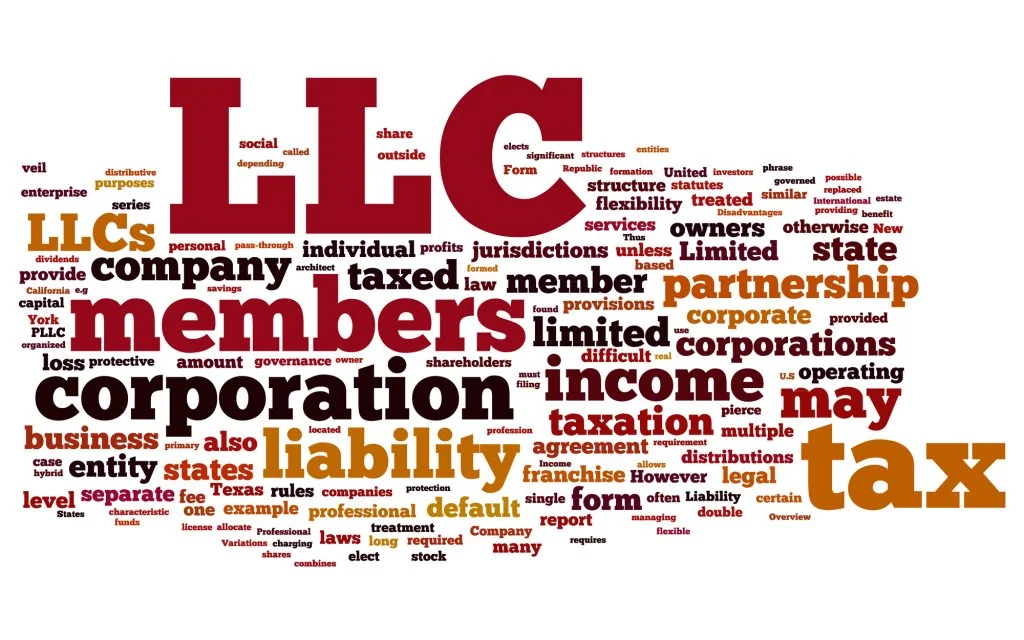In 2023, a record-breaking 5.5 million small businesses were launched in the U.S., many as Limited Liability Companies (LLCs). This surge underscores the growing appeal of LLCs for business owners. They offer protection of personal assets from business liabilities and tax benefits that can boost profitability.
Grasping the key aspects of forming an LLC can significantly enhance your venture’s efficiency and success. This guide delves into the core elements of LLC formation, its benefits and drawbacks, the setup process, and the distinctions between LLCs and corporations. It’s essential knowledge for both seasoned and novice entrepreneurs to navigate the business world effectively.
Key Takeaways
- LLCs provide personal liability protection, safeguarding assets from business debts.
- Forming an LLC can be a straightforward process, often completed in an afternoon online.
- Many states allow flexible membership structures, including individuals and foreign entities.
- LLCs benefit from pass-through taxation, avoiding double taxation faced by corporations.
- A well-structured operating agreement is vital for defining roles and responsibilities.
What is a Limited Liability Company?
A Limited Liability Company, commonly referred to as an LLC, is a versatile legal entity. It offers business owners significant advantages. The LLC definition shows its unique position, blending elements of corporations and sole proprietorships. Owners, known as members, enjoy personal asset protection against company debts and simplified operational structures.
The core feature of an LLC is its flexibility. Unlike corporations, LLCs have fewer compliance requirements, making them easier to manage. Single-member LLCs often file taxes as sole proprietorships, simplifying tax reporting. Multi-member LLCs allow for shared responsibilities and decision-making, enhancing collaboration.
LLCs suit various business sizes, from small to medium enterprises. Yet, states have specific rules for LLC formation and operation. Certain businesses, like banks and insurance companies, may find LLC creation challenging. It’s crucial for members to understand these rules, ensuring compliance through annual reports and state laws.
LLCs are a favored choice due to their many benefits. They protect personal assets in bankruptcy or legal disputes and offer easier management and lower costs than corporations. Understanding auto insurance, as detailed in this article, can also strengthen business resilience.

Benefits of Forming an LLC
Forming a Limited Liability Company (LLC) offers significant advantages for business owners. It provides security, tax efficiencies, and diverse management options. These benefits highlight why many opt for an LLC structure.
Liability Protection
Liability protection is a key advantage of LLCs. Members enjoy a shield that protects their personal assets from creditors. Unlike sole proprietorships and general partnerships, LLCs reduce the risk of personal liability. This allows individuals to venture into business without fear of losing personal property.
Tax Advantages
LLCs benefit from substantial tax advantages. They use a pass-through taxation model, avoiding entity-level taxation. Profits and losses directly transfer to members’ tax returns, simplifying the process and potentially lowering taxes. This feature helps members maximize earnings while minimizing tax burdens, making LLCs a financially strategic choice.
Management Flexibility
LLCs stand out for their management flexibility, unlike more rigid corporate structures. Members can either manage the business directly or appoint managers. This flexibility allows LLCs to tailor their management style to their needs. It fosters an environment where the company can flourish. Customizing management practices boosts operational efficiency and ensures the organization meets its members’ goals.

Disadvantages of Creating an LLC
Forming a Limited Liability Company (LLC) comes with many benefits, but it’s crucial to recognize the potential downsides. Key factors include LLC costs and the implications of ownership transferability.
Cost of Formation and Maintenance
One major disadvantage of LLC structures is the financial costs. The initial setup can be quite expensive. States charge high filing fees, and ongoing expenses include annual reports and franchise taxes. These LLC costs often surpass those of sole proprietorships, making budgeting essential for potential owners.
Transferability of Ownership
Ownership transferability is another challenge for LLCs. Unlike corporations, transferring ownership in an LLC requires all current members’ consent. This complexity can deter investors and limit the ability to sell or transition business interests. It’s vital to understand these limitations when considering an LLC, as they affect ownership flexibility.

| Aspect | LLC | S Corporation |
|---|---|---|
| Formation Costs | Higher filing fees | Generally lower |
| Maintenance Costs | Annual reports and franchise taxes | Minimal compared to LLCs |
| Ownership Transferability | Requires unanimous consent | Easier transfer of shares |
| Investor Appeal | Less attractive for investors | More appealing due to share structure |
How to Form an LLC
Forming an LLC requires several key steps and considerations. It’s vital to understand the LLC formation process well. This ensures business owners set up their company correctly and comply with laws.
Choosing a State for LLC Formation
Business owners must decide which state to register their LLC in. While any state can be chosen, registering in the state where the business operates is usually best. This choice helps avoid the extra fees and requirements of registering as a foreign entity.
Steps to File Articles of Organization
Filing Articles of Organization is a critical step in forming an LLC. Each state has its own form that needs certain information, such as:
- LLC name
- Principal office address
- Purpose of the LLC
- Management structure
- Registered agent details
Designating a Registered Agent
Every LLC must have a registered agent, which is vital for legal compliance. This agent can be an individual or a professional service that receives legal documents for the LLC. The agent must have a state address and be available during business hours. Owners might act as their own agents, but many prefer professional services for legal notifications.
| Step | Description |
|---|---|
| 1 | Choose a state for registration, preferably where the business operates. |
| 2 | Complete the Articles of Organization form with required details. |
| 3 | Designate a registered agent with a physical address in the state. |
| 4 | File the Articles of Organization with the designated state office. |
| 5 | Obtain an Employer Identification Number (EIN) for tax purposes. |
LLC vs. Corporation
Choosing between an LLC and a corporation involves several key factors. Both offer limited liability protection for their owners. A comparison shows distinct differences in taxation, management, and how ownership can be transferred, affecting small businesses significantly.
Similarities and Differences
Both LLCs and corporations shield business owners from personal liability for business debts. They are seen as separate legal entities, allowing owners to keep personal assets separate from business liabilities. Corporations, however, have a more structured setup, needing detailed reporting and recordkeeping. LLCs, on the other hand, offer a simpler setup and maintenance.
Management Structure Comparison
The management structure is crucial in the LLC vs. corporation debate. LLCs offer a flexible structure, where members or managers can run the business. This appeals to many small business owners who value autonomy in decision-making. Corporations, by contrast, have a formal hierarchy, with a board of directors in charge. Transferring ownership in a corporation is simpler than in an LLC, making this a key point in comparing business entities.
| Aspect | LLC | Corporation |
|---|---|---|
| Liability Protection | Yes | Yes |
| Management Flexibility | Members or Managers | Board of Directors |
| Taxation | Pass-through (default) | Corporate tax or S Corp tax status |
| Transfer of Ownership | More complex | Easier |
| Annual Reporting | Varies by state | Required |
Single-Member LLC: What You Need to Know
A single-member LLC is a common choice for small businesses in the U.S. It offers limited liability protection and pass-through taxation benefits. The IRS views single-member LLCs as “disregarded entities,” taxing them like sole proprietorships unless otherwise elected. This setup allows owners to report income and losses on their personal tax returns, simplifying the tax process.
Establishing a single-member LLC provides significant asset protection. In legal disputes, the owner’s personal assets are usually safe from business liabilities. This is a major plus over sole proprietorships, where personal assets are at risk. Moreover, single-member LLCs can continue to operate after the sole member’s death, if there are proper arrangements in place.
Single-member LLCs offer many benefits but come with higher formation and ongoing costs than sole proprietorships. They have stricter naming rules and publication requirements for ownership. Not following these rules can lead to the LLC being dissolved unintentionally. Sole proprietorships, on the other hand, are easier to set up and maintain but lack the essential separation of personal and business assets.
LLCs are ideal for ventures with medium to high risk that need asset protection. Their flexible management and reduced reporting and recordkeeping make them appealing. It’s crucial for owners to draft an operating agreement to detail company operations and maintain formalities to avoid future problems. For more information, visit IRS information on single-member LLCs.
| Feature | Single-Member LLC | Sole Proprietorship |
|---|---|---|
| Personal Liability Protection | Yes | No |
| Taxation Type | Pass-through taxation (default) | Pass-through taxation |
| Formation Complexity | More complex and fees | Simple |
| Continuity of Existence | Yes, with proper provisions | No |
| Administrative Requirements | Higher compliance | Lower |
It’s essential to weigh the pros and cons of a single-member LLC before starting a business. Consulting with experts in LLC formation can ensure compliance and help maintain the business’s good standing.
LLC Operating Agreement
An LLC operating agreement is a critical legal document that details an LLC’s internal operations. It’s essential for LLCs with multiple members, though not always mandatory. This agreement sets out the management structure, operational rules, and financial dealings among members. It ensures clarity and minimizes conflicts.
Importance of an Operating Agreement
Many overlook the significance of an LLC operating agreement. In states like California, Missouri, and New York, it’s a legal must-have during incorporation. Even where it’s not required, having one helps maintain the company’s integrity and smoothens operations. Without it, firms fall back on general state laws, which might not suit their unique needs.
- Protects members from personal liability.
- Defines ownership percentages and member roles.
- Facilitates conflict resolution and decision-making processes.
The agreement details the LLC’s structure, including voting rights, profit sharing, meeting rules, and management duties. It also covers the LLC’s lifespan, registered office location, and buyout provisions.
Financial institutions often demand an operating agreement before offering business services or opening accounts. A well-crafted document boosts an LLC’s legitimacy and readiness to face challenges. Without one, the LLC’s limited liability could be at risk, potentially blurring the line between personal and corporate assets.
For detailed insights on this crucial document, explore the importance of operating agreement. A structured LLC operating agreement is vital for maintaining operational clarity and ensuring all members share the same goals and duties.
| Aspect | Details |
|---|---|
| Typical Length | 10 to 20 pages |
| Cover Items | Ownership percentages, responsibilities, voting rights, profit distribution |
| Member Types | Member-managed or manager-managed |
| State Requirements | Mandatory in certain states, recommended in others |
| Benefits | Limits personal liability, defines company structure, facilitates banking |
LLC Registration Process
Registering an LLC demands a thorough grasp of the steps to register an LLC, which varies across states. In California, the journey starts with picking a distinct business name that must include “Limited Liability Company,” “L.L.C.,” or “LLC.” Following this, the next move is to submit the Form LLC-1 (Articles of Organization) to the California Secretary of State.
Upon filing success, the LLC gains legal acknowledgment with a certificate of formation. Moreover, it must secure the necessary licenses and permits for business registration. California requires filing Form LLC-12 (Statement of Information) within 90 days post-registration, ensuring the state’s records are current regarding the LLC’s management structure.
Staying compliant is vital for the LLC’s legal standing, which entails submitting annual reports and meeting regulatory demands. Grasping these aspects is key to successful LLC registration. For a detailed look at the registration steps, refer to this resource.
LLC Taxes: Understanding Taxation for LLCs
For business owners, grasping the intricacies of LLC taxation is essential for financial success. The tax treatment of LLCs varies significantly, depending on the number of owners and tax election choices. Single-member LLCs are taxed as sole proprietorships, whereas multi-member LLCs are taxed as partnerships by default. This flexibility enables LLC members to select a tax structure that aligns with their business goals.
LLC taxation offers a significant benefit through pass-through income reporting. Members can report their business earnings on their personal tax returns, simplifying the tax process. In 2024, the self-employment tax rate for members is 15.3%, comprising 12.4% for Social Security and 2.9% for Medicare. High earners face an additional 0.9% Medicare tax, applicable to single filers earning $200,000 or more and joint filers making $250,000 or more.
Many LLC members benefit from the Qualified Business Income (QBI) deduction, which allows for up to 20% of total taxable income deduction. To accurately manage self-employment taxes, LLC members typically use Schedule SE when filing their returns. Additionally, LLC owners can choose to file as S corporations, which enables them to pay themselves a salary and allocate remaining profits as dividends, thus avoiding self-employment tax on that portion.
LLCs electing partnership tax treatment must prepare annual partnership tax returns using IRS Form 1065. Conversely, those opting for corporate taxation report income and deductions on Form 1120. The pass-through option is crucial for businesses aiming to avoid double taxation, significantly benefiting the organization’s financial health.
It is imperative for LLC owners to maintain precise records and consult with tax professionals regularly. This ensures compliance with federal and state tax requirements and optimizes their LLC taxes. For insight into privacy practices, read the Privacy Policy for Daily Blogger.
How to Keep Your LLC Active
Keeping your LLC active demands careful attention to state and federal mandates. It’s crucial to stay on top of annual reporting and understand LLC maintenance duties. Adhering to these duties helps avoid penalties and keeps your LLC’s benefits intact.
Annual Reporting Requirements
LLCs must file an annual report or statement of information with the Secretary of State to stay active. Each state has its own set of rules for these reports, and failing to comply can dissolve your LLC. To dodge this, business owners should get to know their state’s annual reporting rules.
Here’s a look at how annual reporting varies across states, showing the differences to remember:
| State | Annual Report Requirement | Filing Deadline | Fees |
|---|---|---|---|
| New York | Yes | Before the anniversary of formation | $9 |
| New Jersey | Yes | Within 60 days of formation | $75 |
| California | Yes | By the 15th day of the 4th month after the end of the tax year | $20 |
| Texas | No annual report | N/A | N/A |
Aside from filing reports, keeping an updated operational agreement and meeting licensing and permit requirements is key. Business owners should sync their record-keeping with their business operations. This approach boosts LLC maintenance and reduces risks. For more details, check out the disclaimer for related insights.
Conclusion
Forming an LLC offers significant benefits for business owners, including liability protection, tax flexibility, and management adaptability. This structure combines elements of sole proprietorships, partnerships, and corporations. It allows entrepreneurs to leverage the best of each while protecting their personal assets. Understanding the intricacies of LLCs, from formation to operating agreements, aids in making informed decisions for long-term success.
Yet, there are potential drawbacks such as formation costs and limitations on ownership transfer. It’s crucial to consider these when comparing LLCs to other business structures, like corporations or partnerships. In states like Idaho, specific regulations affect personal liability and management structures. For deeper insights, explore corporate law implications.
Grasping the complexities of LLCs empowers business owners to lay a solid foundation for their ventures. With proper compliance and flexible management, LLCs can be a powerful tool for growth and stability in a dynamic business environment. For more on the values and community focus of effective content creators, visit Daily Blogger.
FAQ
What is a Limited Liability Company (LLC)?
A Limited Liability Company (LLC) is a legal entity that blends the liability shielding of a corporation with the tax perks and adaptability of a sole proprietorship or partnership. It’s recognized by state laws.
What are the benefits of forming an LLC?
LLCs offer liability protection for personal assets, tax benefits through pass-through taxation, and flexibility in management. Members can choose their management structure.
What are the disadvantages of creating an LLC?
Disadvantages include formation and maintenance costs, such as state fees and annual reporting. There are also limitations on transferring ownership compared to corporations.
How do I form an LLC?
Forming an LLC involves choosing a state for your business, filing the Articles of Organization, and designating a registered agent for legal correspondence.
How does an LLC differ from a corporation?
LLCs and corporations both offer limited liability protection. However, LLCs have a simpler management structure and fewer regulatory requirements than corporations.
What is a single-member LLC?
A single-member LLC has one owner but still enjoys the liability protection and tax benefits of multi-member LLCs. It simplifies the management of business finances.
What is the importance of an LLC operating agreement?
An LLC operating agreement details the management structure, operational procedures, and financial agreements among members. It reinforces the LLC’s separate existence and clarifies roles and responsibilities.
What is the LLC registration process?
The LLC registration process includes selecting a business name, filing the Articles of Organization with the Secretary of State, obtaining necessary business permits, and ensuring compliance with state laws.
How are LLCs taxed?
LLC taxation depends on the ownership structure. Single-member LLCs are taxed as sole proprietorships. Multi-member LLCs are treated as partnerships unless they opt to be taxed as corporations.
How can I keep my LLC active?
To keep an LLC active, owners must adhere to state laws. This includes filing annual reports, paying fees, and maintaining detailed records of business operations.
 dailyblogger.xyz
dailyblogger.xyz



